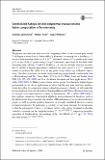Generalized Kakeya sets for polynomial evaluation and faster computation of fermionants
Author(s)
Björklund, Andreas; Kaski, Petteri; Williams, Richard Ryan
Download453_2018_Article_513.pdf (503.5Kb)
PUBLISHER_CC
Publisher with Creative Commons License
Creative Commons Attribution
Terms of use
Metadata
Show full item recordAbstract
We present two new data structures for computing values of an n-variate polynomial P of degree at most d over a finite field of q elements. Assuming that d divides q − 1, our first data structure relies on (d + 1)[superscript n+2] tabulated values of P to produce the value of P at any of the q[superscript n] points using O(nqd[superscript 2]) arithmetic operations in the finite field.
Assuming that s divides d and d/s divides q − 1, our second data structure assumes that P satisfies a degree-separability condition and relies on (d/s + 1)[superscript n+s] tabulated values to produce the value of P at any point using O(nq[superscript s]sq) arithmetic operations. Our data structures are based on generalizing upper-bound constructions due to Mockenhaupt and Tao (Duke Math J 121(1):35–74, 2004), Saraf and Sudan (Anal PDE 1(3):375–379, 2008) and Dvir (Incidence theorems and their applications, 2012. arXiv:1208.5073) for Kakeya sets in finite vector spaces from linear to higher-degree polynomial curves. As an application we show that the new data structures enable a faster algorithm for computing integer-valued fermionants, a family of self-reducible polynomial functions introduced by Chandrasekharan and Wiese (Partition functions of strongly correlated electron systems as fermionants, 2011. arXiv:1108.2461v1) that captures numerous fundamental algebraic and combinatorial functions such as the determinant, the permanent, the number of Hamiltonian cycles in a directed multigraph, as well as certain partition functions of strongly correlated electron systems in statistical physics. In particular, a corollary of our main theorem for fermionants is that the permanent of an m × m integer matrix with entries bounded in absolute value by a constant can be computed in time 2[superscript m−(√m/ log log m)], improving an earlier algorithm of Björklund (in: Proceedings of the 15th SWAT, vol 17, pp 1–11, 2016) that runs in time 2[superscript m−(√m/ log m)].
Date issued
2018-09Department
Massachusetts Institute of Technology. Department of Electrical Engineering and Computer ScienceJournal
Algorithmica
Publisher
Springer US
Citation
Björklund, Andreas, et al. “Generalized Kakeya Sets for Polynomial Evaluation and Faster Computation of Fermionants.” Algorithmica, Sept. 2018. © 2018 The Authors
Version: Final published version
ISSN
0178-4617
1432-0541